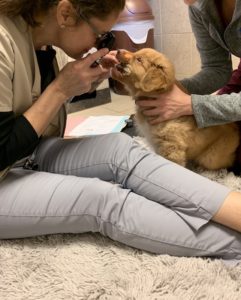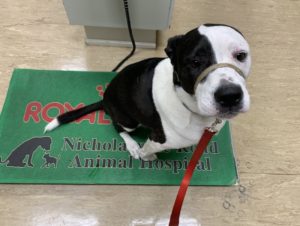What I Want Veterinarians to Know About Dog Trainers
 Most veterinarians understand the importance of having a good trainer as part of their team. Working with a qualified trainer can not only keep dogs in their homes, but they can also help a family choose a new dog. Dog trainers are also a great resource to assist with recovery and healing through the use of mental enrichment while on crate rest or limited activity. We can also help ease the stress of scary vet visits that may keep owners from seeking the medical treatment their dog needs. If I had a chance to to talk with veterinarians, this is the information I would like them to know.
Most veterinarians understand the importance of having a good trainer as part of their team. Working with a qualified trainer can not only keep dogs in their homes, but they can also help a family choose a new dog. Dog trainers are also a great resource to assist with recovery and healing through the use of mental enrichment while on crate rest or limited activity. We can also help ease the stress of scary vet visits that may keep owners from seeking the medical treatment their dog needs. If I had a chance to to talk with veterinarians, this is the information I would like them to know.
What I Want Veterinarians to Know About Dog Trainers
- Trainers can help keep clients in your practice.
- It’s true. Most dogs are turned into shelters and rescues because of undesired behaviors. What happens then those dogs go to shelters or other homes? They come out of the veterinary practice. Working with a qualified trainer helps keep those dogs in their homes and in your practice. See below for how to find that qualified trainer.
- Not all trainers are the same.
- I know I sound like a broken record on this one because I say it all. the. time. But it’s so true. Take the time to interview trainers that you will be referring too. Call trainers in to do a 15 minute meet and greet and ask about their methods, and education. Do their standards and values match those of your clinic? Are they focusing on the human animal bond using the least invasive methods available? Most trainers give a discount to veterinary professionals. If you can’t take a class, go observe once or twice. Reach out to your local trainers or take the time to respond to their requests for meet and greets or lunch and learns. Good trainers want to work with the veterinary team as part of a training or behavior modification plan. The American Veterinary Society of Animal Behavior has a great online resource for “How to Choose A Trainer”
- Do you know what certifications mean? Do you know what certifications are out there? Below is a list of the most common certifications and professional organizations. You can check out my credentials here if you are interested. This is a great place to start when looking for trainers in your area as most of these organizations keep an online list of qualified trainers. While not all trainers pay to keep a listing online with the group, look for these titles on business cards, handouts, etc. Each group below has their own certification guidelines. It’s usually a quick process to read their standards and find out what testing or evaluation has been done for a trainer to hold one or more of these titles.
-
- Karen Pryor Academy – KPA CTP – Certified Training Professional
- Association of Professional Dog Trainers
- Certification Council for Professional Dog Trainers
- CPDT-KA – Knowledge Assessed
- CPDT-KSA – Knowledge and Skills Assessed
- CBCC-KA – Certified Behavior Consultant Knowledge Assessed
- International Association of Animal Behavior Consultants
- CDBC – Certified Dog Behavior Consultant
- Fear Free Pets
-
- Many behavioral issues are due to medical issues.
- Dr. Amy Pike, DVM, DAVCB has a great read, “Medical Causes of Behavior Problems in Dogs and Cats”. Trainers often see dogs where they are most comfortable and will exhibit symptoms that might not surface in an exam room. It’s also not uncommon for clients to share information or concerns that they wouldn’t normally bring up in a veterinary visit. Encourage the trainers you refer to to share progress or changes with you throughout their training plans. Dogs that have a history of chronic pain or pain associated with a particular incident may need the help of a qualified trainer to counter condition or desensitize that association. If you have a patient that has suffered an injury or is being treated for chronic pain, suggest a trainer to help with any behaviors that may be a result of that pain.
- Training for recovering patients and crate rest cases.
- Occasionally it’s necessary for dogs and even puppies to have to be put on limited activity and or crate rest. For puppies this can be detrimental to their mental development and socialization. For adult dogs this is incredibly boring and can create undesired behaviors such as destruction or even self mutilation. Training doesn’t have to be physical to be effective. There are many crate games, and low activity games that can both stimulate the mind while being easy on a recovering body. One of my favorite cases was an older puppy that was unfortunately hit by a car the week before class started. The puppy had a broken leg and was on crate rest. We did the entire 6 week class with the puppy in a crate. She learned all her basics in a crate and YES, the behaviors carried over outside of the crate. Her leg healed perfectly and she didn’t miss out on training during a critical time in her development.
- Hard To Treat Patient

- Every vet has a story about those nightmare patients. The ones who are extremely fearful and make even the most simple of procedures a costly and unpleasant experience for everyone involved. Dogs can be taught to accept low stress blood draws, as seen in this video, low stress nail trims as seen in this video, as well as many other common veterinary procedures like ear cleaning, eye drops and vaccines. Our training center offers a class specifically designed to teach these techniques to hopefully make stressful visits a little less so. More information about that class is available on our scheduling page. I have been thankful on more than one occasion that my dogs are comfortable with veterinary procedures. It has given me time with them that I wouldn’t have otherwise had and has made recovery from major surgeries easier.
- Prevention
- Getting dogs into socialization and training early is key. Quoted from The American Veterinary Society of Animal Behavior, “In general, puppies can start puppy socialization classes as early as 7-8 weeks of age. Puppies should receive a minimum of one set of vaccines at least 7 days prior to the first class and a first deworming. They should kept up to date on vaccines throughout the class.” While it is still commonly suggested by many veterinarians, puppies do not and should not wait until all vaccines have been given to start training.
- New dogs. Established clients that are thinking of getting another dog should be put in contact with a trainer to help with the new addition. Many trainers can even help owners make choices on finding a reputable breeder, shelter, or rescue group. Trainers can also help the owners introduce new housemates safely, giving the best chance for a successful addition to the family. Our Puppy Head Start class is open enrollment, offering class two nights a week. It is by far our most important of the classes we offer.
There are occasions when the situations are difficult and we need an outside opinion or assessment. In cases of severe anxiety, fear, or aggression, a Veterinary Behaviorist can be very helpful. While not available in all areas, most will consult with a general practice vet office for little to no charge. A veterinary behaviorist can help with medication choices and protocols. Research is happening all the time in the field of behavior and there are so many options for treatment. To find the nearest Veterinary Behaviorist, check out the American College of Veterinary Behaviorists to find the nearest one to your area.

